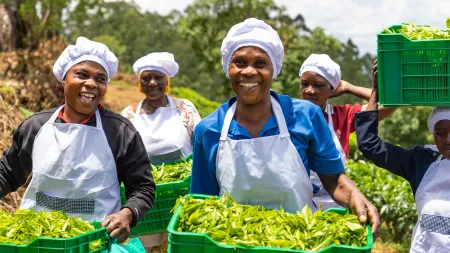“In our culture, this work is for men, but I challenged myself to grow in this career” – Latifa*, VSLA Member from Tanzania. She is part of the Her Money, Her Life project where women are breaking barriers and reshaping the value chain of Tanzania’s specialty tea industry, traditionally a male-dominated crop. This innovative program builds upon the Village Savings and Loan Associations (VSLA) model to connect women farmers with sustainable opportunities in the tea supply chain, focusing on strategic partnerships and collective action to challenge social norms. Her Money, Her Life is not just about growing tea—it’s about growing women’s economic power, enhancing gender equality, and unlocking a brighter future for the tea farming families and communities across Tanzania.
Her Money, Her Life worked with 30,000 community members, including more than 2,000 VSLAs, in tea growing regions of Tanzania from 2021-24. The project was co-developed with social enterprise Kazi Yetu and worked in partnership with the Tea Board of Tanzania, Tea Research Institute of Tanzania and Tanzania Smallholders Tea-Development Agency, with funding from Bloomberg Philanthropies. It aims to expand this model to more value chain communities in the region.

In Korogwe, women are not just growing and plucking tea. They are employed in further roles in the factory including processing or packaging. The smallholder cooperative also has a stake in the factory and elects members to the company’s board, with women increasingly participating in decisions and shifting perceptions of the role they can play in building economic prosperity.
What changed?
Women have increased income: A 546% income increase was reported by one smallholder cooperative from selling processed tea. 95% of members reported an increase in individual savings due to their participation in VSLAs in the past 12 months and 98% of participants reported improvements in their household income. A 17% rise in green leaf tea prices boosted income for all tea farmers. Many women also diversified into herbs and spices, accessing new markets for greater financial independence.
Women are more equal at home: 82% of women smallholder tea farmers reported active participation in economic decisions within their households. 91% of women reported improved relationships with their partners.
Women are pooling their resources: 87% of participants in this project engaged in collective ventures through VSLAs, investing in small businesses and farming equipment.
Women’s potential is being recognized: The Government of Tanzania has committed to constructing five more tea processing factories following the women-led model of the Sakare Specialty Tea Company.
How did we get there?
Entrepreneurship and collective action: VSLAs enabled women to pool resources for investments, increasing productivity and income through a greater ability to invest in improved equipment and farming techniques.
Challenging social norms: Couples’ dialogue for VSLA members, Social Analysis & Action (SAA) within communities, and national radio campaigns all challenged gender norms in tea production, shifting perceptions of women’s roles in the value chain.
Improved market access: Connections were built between VSLAs and private sector companies, increasing opportunities for women to access further training on quality standards and ensuring they had reliable buyers for their crops. · Doing business differently: A unique partnership between project co-lead Kazi Yetu, a social enterprise, and a smallholder cooperative formed of VSLA members created the Sakare Specialty Tea Company. Women from the cooperative have a share in this so they can influence decisions and the company’s demonstration factory is being used as an example to showcase the potential of women tea farmers to add value to the value chain in Tanzania.
Extensive government engagement: The project convened quarterly reflection meetings with partners from government departments so they could work together to identify opportunities and overcome unexpected challenges.
Next steps
Policy advocacy: Continuing work with stakeholders in the Tanzanian government to improve regulatory and financial systems, ensuring women have better access to land ownership and banking services that enable entrepreneurship.
Collective investment: Expanding the collective investment approach to new locations.
Building market linkages: Continuing to build connections between VSLA members and business opportunities.
Want to learn more?
Her Money, Her Life VSLA Spotlight Brief
